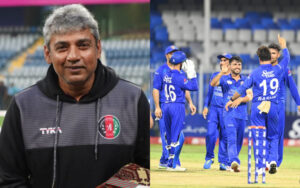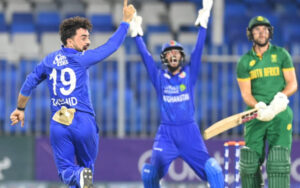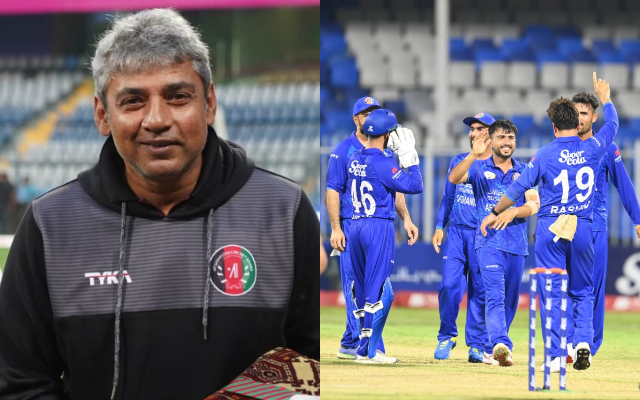
I hadn’t met Ajay Jadeja in years. And yet, it was as easy as could be. Jadeja was relaxed and warm and the conversation got going within seconds. “I almost missed the flight from Delhi,” he said. “It was pouring. That’s why I just jumped out and got into the metro. You can reach the airport much faster that way in Delhi.”
That was when the conversation turned to Afghanistan and his role during the 2023 World Cup. Gautam Bhattacharyya, who was with us, asked him why it was that he did not take money for the assignment. Jadeja, charming as always, answered with a smile: “You don’t ask for money from people who don’t really have money to give you. But all that apart, it was not something I did for money. I got a call from a player, Rashid [Khan], and he asked me if I could help them.
“May be he did not get anyone else and reached out to me. Jonathan Trott was the coach, and my role would be a limited one. I saw it as an opportunity to help a fantastic bunch of cricketers. A group that loves to play the sport. The truth is I would treat myself as fortunate if I was able to make a difference. There was no hesitation in accepting the request.”
That World Cup journey nearly took them to the semi-finals last November. Then, in June 2024, they did break that glass ceiling, storming into the last four of the T20 World Cup before a poor outing against South Africa cost them the chance of a dream final against India. This week, though, they exacted a measure of revenge, thrashing South Africa in back-to-back matches to win an ODI series against them for the first time.
For the Latest Sports News: Click Here

The Afghanistan story, as we all know and recognise, isn’t just a cricket tale. It is more about life and what sport can do. How sport can help shape identity and offer a new lifeline and fresh opportunities. Give people back home a belief that they could also make a mark if they pursued their dreams. When we asked Jadeja this, he was at his best.
“You are absolutely right about Afghanistan cricket,” he said. “It is not just a sport. When you meet these cricketers, you will know how good they are. But the thing with them is they don’t know this at times. They don’t know what all they can do. How good they are. The job was simple. From a position where they felt it was good enough to just be there and compete, to telling them they could beat the best. This was the difference we tried to make. To instil the belief that they were as good and could beat the very best. Once they realised this, the job was done. What I can also tell you is they are great ambassadors for the sport and deserve all the success finally coming their way.”
As the conversation moved to Indian cricket and to skipper Rohit Sharma, Jadeja made a very interesting point. “Good captains are often compassionate people,” he said. “Rohit is no different. Because he has seen the ups and downs and knows what it takes to succeed, he can understand what players go through when they aren’t doing well or when they are injured and trying to make a comeback. It is this understanding which makes him a good leader and captain and it comes from his own experience of having been in difficult situations before.”
With many young cricketers from Bengal waiting for their share of selfies and autographs, and with Jadeja taking a late evening flight back to Delhi, we missed out on having a meal together. But nonetheless, it was an afternoon well spent at the Cricket Association of Bengal (CAB) annual awards function, and a conversation that Gautam Da and I much enjoyed.
Also Read: South Africa Women’s Team: Strengths and Weaknesses for the 2024 ICC T20 World Cup




